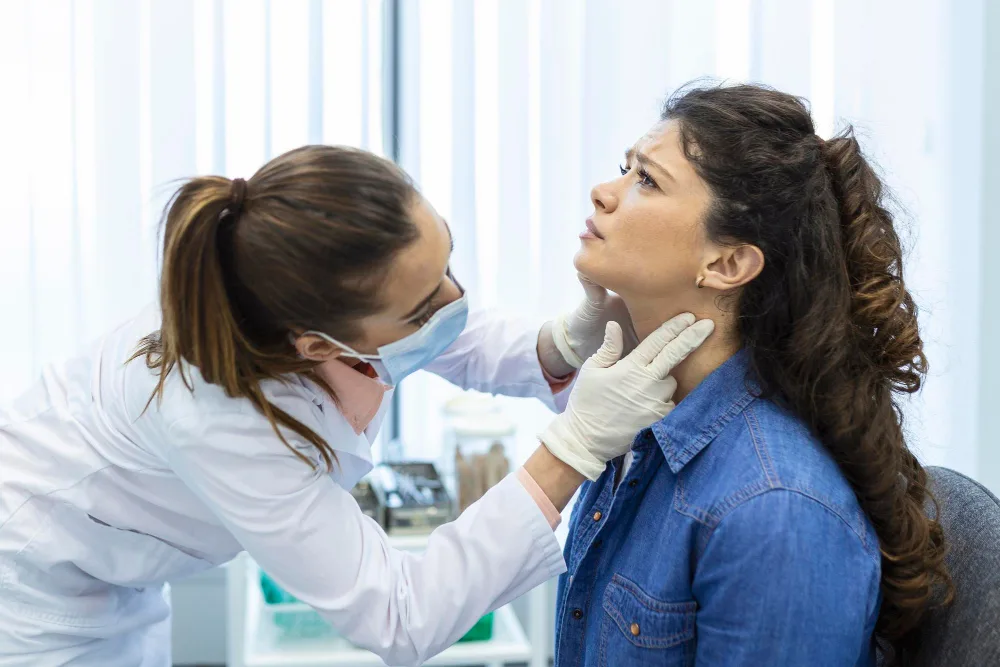Why Would You Need Thyroid Surgery?
Category: General Surgery
Thyroid surgery is performed when certain thyroid conditions cannot be effectively managed with medications or lifestyle changes. This procedure involves partial or complete removal of the thyroid gland and is commonly advised for patients with large goiters, nodules, hyperthyroidism, or suspected thyroid cancer. Advances such as minimally invasive and robotic approaches have made thyroid surgery safer and more precise.
At Lokmanya Hospital, thyroid surgeries are carried out with a patient-first approach, using advanced technology and international surgical standards. The hospital is known for its expertise in conventional as well as robotic thyroid surgery in Pune, ensuring minimal scarring, reduced complications, and faster recovery for patients.
Reasons You May Need Thyroid Surgery
Thyroid surgery is recommended when certain conditions affect the thyroid gland, causing symptoms or health risks. Understanding the reasons for surgery helps patients make informed decisions and prepare for treatment.
1. Thyroid Nodules
Thyroid nodules are lumps that form in the thyroid gland. While most are benign, some can grow large enough to cause discomfort, difficulty swallowing, or breathing issues. Nodules that appear suspicious on biopsy are often removed surgically to ensure they are not cancerous. Surgery helps relieve symptoms and provides a definitive diagnosis.
2. Thyroid Cancer
Thyroid surgery is the primary treatment for confirmed or suspected thyroid cancer. Depending on the size, location, and stage of the cancer, surgeons may remove part of the thyroid (lobectomy) or the entire gland (total thyroidectomy). This procedure prevents the cancer from spreading and allows for proper staging and further treatment, such as radioactive iodine therapy if needed.
3. Large Goiter (Enlarged Thyroid)
Goiters are enlarged thyroid glands that can interfere with breathing, swallowing, or cause visible neck swelling. When a goiter grows large or causes discomfort, surgical removal helps relieve pressure and restore normal function. Surgery also addresses cosmetic concerns and prevents potential complications related to large goiters.
4. Hyperthyroidism (Overactive Thyroid)
When the thyroid produces excess hormones, it can lead to symptoms like rapid heartbeat, weight loss, and anxiety. If medications or radioactive iodine therapy fail to control the condition, surgery may be recommended. Removing part or all of the thyroid helps regulate hormone production and prevent long-term complications.
5. Recurring Cysts or Infections
Some thyroid cysts or infections can recur despite repeated treatments such as aspiration or antibiotics. Surgery is advised when these cysts persist or cause repeated inflammation. Removing the affected tissue prevents further infections and ensures the thyroid functions properly.
Types of Thyroid Surgery
- Total Thyroidectomy: Removal of the entire thyroid gland, often done in thyroid cancer cases.
- Lobectomy (Hemithyroidectomy): Only one thyroid lobe is removed, usually for localized nodules.
- Subtotal Thyroidectomy: A partial removal that preserves some thyroid tissue.
- Robotic Thyroid Surgery: Advanced surgery performed through hidden incisions, reducing visible scarring and improving recovery.
Possible Complications of Thyroid Surgery
- Temporary or permanent voice changes due to nerve involvement.
- Low calcium levels if parathyroid glands are affected.
- Rare cases of infection or bleeding.
- With expert care at Lokmanya Hospital, risks are minimized, and most patients recover quickly.
Why Choose Lokmanya Hospital for Thyroid Surgery?
At Lokmanya Hospital, each thyroid surgery is customized according to the patient’s condition, age, and overall health. The surgical team includes highly skilled endocrine and robotic surgeons with years of experience. With modern diagnostic facilities and cutting-edge robotic systems, patients receive precise treatment with the least discomfort.
The hospital also ensures a seamless journey with pre-operative evaluation, expert anesthesia care, and dedicated post-operative monitoring. From traditional to robotic thyroid surgery in Pune, Lokmanya Hospital provides holistic care, prioritizing safety, recovery, and long-term wellness.
Conclusion
You may need thyroid surgery for conditions like nodules, cancer, large goiters, hyperthyroidism, or recurring cysts. Thanks to medical advancements, the procedure is now safer, less invasive, and more effective.
At Lokmanya Hospital, patients benefit from advanced techniques, experienced surgeons, and compassionate care. Whether it’s conventional or robotic thyroid surgery, Lokmanya ensures reliable outcomes and a smooth recovery journey.
FAQs
1. Why would someone need thyroid surgery?
Thyroid surgery is advised for nodules, cancer, large goiters, hyperthyroidism, or recurring cysts that do not respond to other treatments.
2. What are the types of thyroid surgery?
They include total thyroidectomy, lobectomy, subtotal thyroidectomy, and robotic thyroid surgery.
3. Where is the incision for thyroid surgery made?
Traditionally, in the front of the neck. In robotic surgery, incisions are made under the arm or behind the ear to avoid visible neck scars.
4. What are common thyroid surgery complications?
Voice changes, low calcium levels, infection, and bleeding are possible but rare in skilled surgical care.
5. Is robotic thyroid surgery available in Pune?
Yes, Lokmanya Hospital offers advanced robotic thyroid surgery in Pune, ensuring precision and minimal scarring.
6. How long does recovery take after thyroid surgery?
Most patients return to routine activities within 1–2 weeks, though full recovery may take longer.
7. Is thyroid surgery painful?
Mild pain or discomfort is common but well controlled with medications.
8. What is the thyroid surgery cost in India?
The cost varies by type of surgery and hospital, but Lokmanya Hospital offers affordable, high-quality packages for patients.
Previous blog

How Common is Thyroid Surgery?
Next blog






